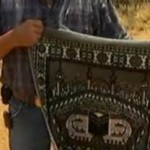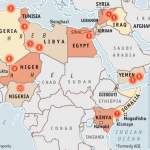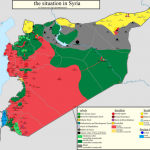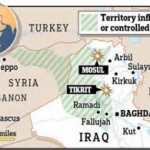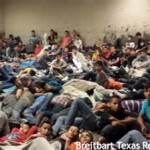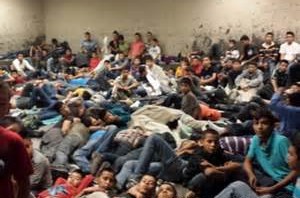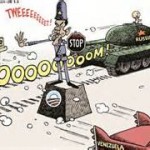Much has been written that Barack Obama is feeble when it comes to foreign policy. There is the matter of Syria where deference was given to Putin by the White House to handle matters regarding the civil war there as well as the chemical weapons. Well, now additional chemical weapons are being used today that are chlorine based barrel bombs. Then there is Iraq where war again is as bad today as it was in 2004.
One cannot overlook the matter of the Budapest Memorandum where the United States as well as the United Kingdom must protect Ukraine with something more than a VP Joe Biden visit and MRE’s.
Completely ignored until 300 girls were kidnapped in Nigeria by Boko Harem, it was not until the media reported the vast kidnappings that we found that neither Hillary Clinton or John Kerry listed Boko Harem on the FTO (Foreign Terror Organization) list. Heck it was not until this past January of 2014 that the attackers in Benghazi, Ansar al Sharia was listed on the FTO.
There is a war brewing in the South China sea where China continues to be aggressive over disputed islands involving Japan, Vietnam and the Philippines.
So, sanctions rule and go where no offensive measures shall. Diplomatic victories should prevail for sure but to date, all diplomatic efforts and talks have failed with Iran nuclear negotiations are now permanently broken as is the matter between Israel and the Palestinians.
The truth be known, America is at war and Barack Obama has not figured out how to be a war time president except to retreat without tangible victories anywhere.
Allies are asking hard questions of the White House and not getting any responses, so their conclusions are such that they doubt seriously that America even with NATO’s Article 5 will not be at their side at all.
—-
May 27, 2014
U.S. Foreign Policy Barack Obama Is Accused Of Timidity Overseas, Raising Fear and Anger Among The Country’s Allies.
By Geoff Dyer
When President Barack Obama ran for re-election in 2012, he pulled off what for Democrats was a remarkable feat – he took foreign policy off the table as a campaign issue. Ever since Harry Truman was accused of “losing China”, Republicans have sought to cast their Democratic opponents as weak in the face of foreign challenges. Yet fresh from his risky but successful military operation to kill Osama bin Laden, Mr. Obama side-stepped the usual assault during his re-election campaign. His challenger Mitt Romney hardly brought up foreign policy. Eighteen months later, the political ground is shifting rapidly beneath Mr. Obama’s feet. As he prepares to give an important address on foreign policy at West Point tomorrow, the president finds himself under attack over what critics charge is a record of indecisive leadership. The loudest voices have been Mr. Obama’s political opponents at home, but the critique of a rudderless, risk-adverse president has also found strong echoes among some of America’s most important allies. From Saudi Arabia to Japan, officials have been wondering whether the US would still come to their defense. Mr. Obama’s election in 2008 reflected a widespread belief at home and abroad that there was “too much America” in the world. Although he still seems to be in tune with the US public, Mr. Obama faces the accusation that there is now too little. Even John Kerry, his secretary of state, appeared to acknowledge this international perception in a speech last week. “We cannot allow a hangover from the excessive interventionism of the last decade to lead now to an excess of isolationism,” he told students at Yale. “Most of the rest of the world doesn’t lie awake at night worrying about America’s presence – they worry about what would happen in our absence.”
In his West Point speech, Mr. Obama will lay out how the US intends to “lead the international community but without getting overextended”, as a White House official puts it. But the persistent attacks have left Mr. Obama in a defensive crouch, tetchily defending his cautious approach. “That may not always be sexy. That may not always attract a lot of attention, and it doesn’t make for good argument on Sunday morning shows,” he said during a recent Asia trip. “But it avoids errors.” The rap sheet on Mr. Obama has two basic charges: that he is too timid in his approach to foreign affairs; and that the US has begun a process of retreating from its place in the world during his presidency. “On all these issues, our response has been to do the minimum and no more,” says Bob Corker, the leading Republican on the Senate foreign relations committee. “Every allied government I talk to, I get the same questions about whether we will be there.” On one level, the claim that Mr. Obama is too passive is part of a longstanding intellectual debate in Washington about foreign policy.
When he was first elected, many analysts pegged Mr. Obama as an idealist – a reflection of his stirring rhetoric, his reaching out to the Muslim world and his longstanding association with Samantha Power, now his UN ambassador and the leading intellectual voice of liberal interventionism. Instead, in recent years Mr. Obama has revealed himself as a president more rooted in a realist tradition that is more focused on the defense of national interests and is wary of moral causes. This should not have come as a complete surprise: even during his first election campaign, he told interviewers of his respect for the foreign policy of George HW Bush. Mr. Obama’s reticence over Syria reflects a belief that it is better to avoid mistakes than to appear decisive. “The United States has a hard-earned humility when it comes to our ability to determine events inside other countries,” Mr. Obama said in a speech to the UN last September. “Obama’s mistake on Syria was not that he did not follow through on the red line he set [about the use of chemical weapons],” says John Mearsheimer, the University of Chicago scholar who is one of the leading realist thinkers. “It was setting a red line in the first place.” (He adds that he believes Mr. Obama “95 per cent supports” his point of view.) Such a world view, however, puts the president at odds with a large part of the US foreign policy establishment on both the left and the right, which, despite the traumas of Iraq, is still instinctively interventionist.
Some supporters worry that the president’s caution can become an excuse for inaction. Zbigniew Brzezinski, the former national security adviser, says that he believes Mr. Obama often has the right instincts but that “he does not always translate that into diplomatic strategies to achieve his goals”. Mr. Obama has added to the impression of dithering and inaction through his highly deliberative style of decision-making, which is in stark contrast to George W Bush’s reliance on gut instinct. The months of painstaking discussion in the first term over whether to put more troops into Afghanistan have been matched in the second term by a series of reviews of Syria policy, which have each ended with Mr. Obama deciding to do little. The root cause of much of the angst about Mr. Obama has been his public wobble last September over whether to launch Tomahawk missiles against Syria, culminating in the walk on the White House lawn when he decided to punt the issue to Congress. Outside of the Middle East, few US allies were worried about the details of the proposed Syria strike: what rattled them was the sight of a US president making a threat and then deciding he did not have the political authority to carry through with it. “We have lost some of the aura we used to enjoy in the region,” says Vali Nasr, a former state department official in Mr. Obama’s first term who has been a strong critic of the administration’s approach to the Middle East. Since then the humanitarian catastrophe of the Syrian war has only deepened, yet Mr. Obama has consistently resisted pressure from within his administration to do more. Even those aides who agree with his caution admit it has been an inglorious episode.
The unfolding events in Europe and Asia have also fed the perception of a US president losing his capacity to shape events abroad. At a time that the Pentagon budget is being cut, China is increasingly bent on pursuing its territorial claims and on challenging American naval dominance in the western Pacific. In Ukraine, Vladimir Putin has been able to annex Crimea and to destabilize parts of the east of the country while the west has scrambled to come up with a response that will be effective in the short term. “While the wolf is eating the sheep, there is no shepherd to come to the rescue of the pack,” former Saudi intelligence chief Prince Turki al-Faisal told the FT. The second, broader argument about the Obama presidency – that the US is disengaging from the world – is much harder to support. After all, the Afghanistan mission, which formally ends this year, is the longest-running conflict in US history.
The strongest complaints about American retrenchment have come from the Middle East. Yet even after the withdrawal from Iraq, the US military presence in the region remains formidable, following a dramatic expansion in recent decades. During the second term of Ronald Reagan, at the height of the cold war, the US had an average of 8,800 troops in the Middle East: it now has 35,000. “Over the years we have steadily militarized our approach to the Middle East, which has not always been in our interests,” says Dennis Blair, the retired admiral and former Director of National Intelligence. In some parts of the region and south Asia, Mr. Obama has provoked anger not for reticence over Syria, but for his aggressive use of drone strikes or cyber attacks against Iran. Indeed, a significant part of the criticism from allies in the Middle East has been much less about the credibility of the American president and more about basic differences in interests. Washington’s biggest focus is preventing Iran from obtaining a nuclear weapon without starting a new war. The Saudis and Israelis, however, are incensed that the US would negotiate with a country they believe to be a rival for regional influence or an existential threat. Many of the Sunni-dominated Gulf nations see the Syrian war in sectarian terms and want to defeat Shia Iran. Yet the sectarian nature of the conflict is one of the main reasons the US is reluctant to get involved.
In Asia, the Obama administration is expanding America’s military presence, signing agreements with Australia and the Philippines for much greater access to bases and deepening co-operation with Japan. One explanation for recent Chinese assertiveness is that Mr. Obama has been pushing too hard rather than that he is considered a pushover.
Europe is the one place where the US military footprint has significantly shrunk. However, the case for a bigger American presence in Europe would be easier to make if European governments were not slashing their own defense budgets. Moreover, it is a stretch to suggest that Russia felt emboldened to annex Crimea because there were fewer US soldiers stationed in western Germany. “We should worry less about putting more NATO troops in the Baltics, and more about whether there are disaffected Russian populations that Putin can take advantage of,” says Thomas Graham, a former White House official under George W Bush.
Sometimes lost in Washington’s rancorous debates are the changes taking place in the world, the underlying shift in relative power that is being caused by the “rise of the rest”, the new generation of great powers that are staking their own claims. The crises facing the administration are in many ways an early example of the harsh realities that a more multipolar world can bring. Countries such as China and Russia appear to have found new ways to gradually chip away at US influence, pursuing territorial claims in Crimea or the South China Sea in a manner that fall well short of casus belli. The fresh strategies that the US will require to meet this sort of challenge are rarely captured in the discussions about decisive presidential leadership.
Jeremy Shapiro, a former Obama administration official now at the Brookings Institution, highlights this changed foreign policy landscape. “With such a structural shift in international politics, the US will need to operate in different ways, but we are still struggling to come to terms with the new reality,” he says.

